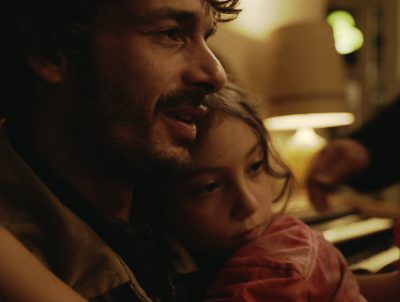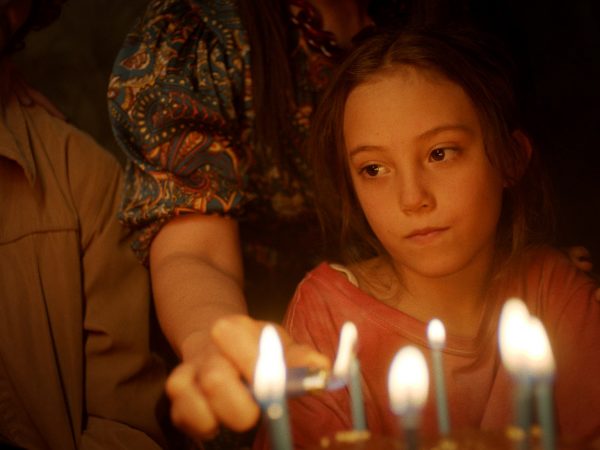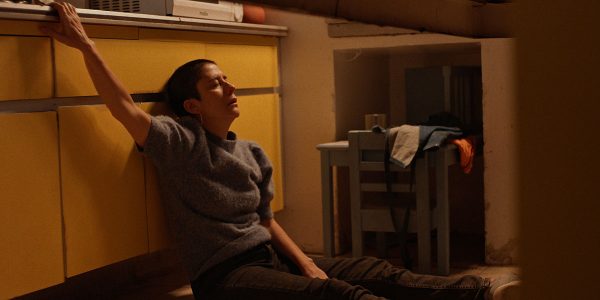
“Tótem” (2023). Cast: Naíma Sentíes, Iazua Amador, Montserrat Marañon, Saori Gurza, Marisol Gasé, Mateo García Elizondo, Teresita Sánchez, Marisela Villarreal, Alberto Amador, Juan Francisco Maldonado. Director: Lila Avilés. Screenplay: Lila Avilés. Web site. Trailer.
Sol is not the only one having difficulty dealing with these circumstances. Tona’s sisters, Nuria (Montserrat Marañon) and Aléjandra (Marisol Gasé), provide for the daily needs of their brother with the aid of a professional caregiver, Cruz (Teresita Sánchez). Together, they make sure Tona has a roof over his head and vigilantly attend to his well-being. But, given that they’re so close to the situation, they witness the heartbreak of Tona’s decline firsthand, making for trying circumstances and prompting them to look for ways to cope. Then there’s Lucia (Iazua Amador), Sol’s mother, who has the dual responsibility of attempting to assist in the management of both Tona’s physical state and their daughter’s emotional health. The four women do their best to meet these challenges, but, after all, they’re only human. They thus each struggle to come up with their own means of addressing this difficult situation, some of which create additional issues of their own.
Of course, when trying to lift someone’s spirits, it doesn’t help to let one’s own feelings of despair become apparent, in this case for both Tona and Sol. So, to counter the prevailing sense of gloom, the family decides to throw a birthday party for Tona. He’s not particularly keen on the idea, given his worsening health and his dread of loved ones seeing how far he has slid. But his relatives insist on holding the party, whether or not he chooses to make an appearance. The event is intended not only to acknowledge that he has made it to yet another birthday, but also to provide an opportunity for his family and friends to show him how much he means to them, a celebration of life – and, everyone hopes, a meaningful one at that. After all, this could well be the last chance for something like this to take place.

But efforts aimed at promoting Tona’s well-being involve more than just throwing him a party. For instance, Uncle Napo (Juan Francisco Maldonado) spends considerable time looking into various treatment options. Likewise, Aléjandra is willing to try implementing alternative approaches, including practices based on native Mexican spiritual beliefs, such as having the house smudged with sage by a colorful shamanic practitioner, Lúdica (Marisela Villarreal), and conducting meditative prayer circle sessions with the entire family.
And, through all this, everyone pitches in to help Sol cope with everything that’s going on around her. She’s experiencing a wide range of emotions, from sorrow to confusion to anger, and she’s having difficulty understanding how to express them under the circumstances. But it often seems that things are so big that they’re more than she can handle.
In some ways, this would appear to be a no-win situation all the way around. But is giving up a truly viable option? There must be a way to evoke some good out of circumstances like these, but how can it be achieved? The starting point for an undertaking like this begins with our beliefs, for these powerful tools shape what emerges in our existence. This is the product of the conscious creation process, the philosophy that maintains our thoughts, beliefs and intents are responsible for the manifestation of our reality. It’s unclear how many of us are aware of or seek to implement this school of thought. However, given the breadth of possible beliefs, this thinking provides us with the means to materialize a virtually infinite range of options, including finding ways to draw the good out of seemingly otherwise-dire conditions. Or, in this case, helping to provide love, meaning and support to a dying man and a scared little girl at a critical time in the unfolding of their lives.
As noted above, that’s especially crucial where both Sol and Tona are concerned. They need relief from the oppressive conditions weighing on them. And, in Sol’s case, it’s also essential for providing clarity in her thinking. Her worries have obviously gotten in the way of enabling her to see things clearly, planting errant beliefs in her mind that, unfortunately, have a way of clouding her judgment and putting elements into place in her existence that are both off-base and don’t serve her well-being.

This is also true, to a certain extent, where other family members are concerned. Consider Nuria’s case, for example. She’s distraught over her brother’s condition, and that distraction is getting in the way of her carrying out seemingly simple tasks, like baking a birthday cake. It doesn’t help that these beliefs have also prompted her to engage in excessive drinking, a behavior that has contributed to the foregoing anxiety and the beliefs that feed into it, as well as creating new problems of their own.
Similarly, there’s the quiet despair of Roberto (Alberto Amador), Tona’s aging father, who has himself experienced his share of health-related issues. He feels helpless to assist in his son’s care, given his own well-being challenges, and dreads the thought of outliving one of his children. Such beliefs evoke occasional emotional outbursts, his anger at the circumstances getting the better of him.
This is where the value of inventive solutions comes into play. Not only do they have the potential to make things better, but they have the power to help relieve the stress on those closest to Tona and Sol. Aléjandra’s hiring of the “house cleaner,” for instance, is an attempt at employing something alternative to help create a more soothing (and possibly healing) environment for Tona. And, even if it doesn’t work, it beats doing nothing and letting the prevailing conditions take over unfettered.
And then, of course, there are the festivities themselves, which are the central focus of the film’s story. The family truly wants to make the celebration fun and special for Tona and Sol, given that there may not be any more after this one. They arrange an extensive, diverse joyful event for the guest of honor, one that’s somewhat challenging to pull off in light of the expense involved. So much of the household income goes to paying for Tona’s medical bills and caregiving that it makes things financially tight for throwing a big party. But the family believes it’s worth it, both as a celebration of Tona’s birthday and as a celebration of his life. It’s hard to imagine a more fitting and more uplifting tribute to someone facing death.
As hard as it may be to imagine, there’s a great deal of fun going on here, both for the characters and viewers alike (especially during the smudging sequence). It’s somewhat surprising to see how much comic relief has been incorporated into this picture’s narrative. But it serves a useful purpose, showing the characters how it’s possible to stay upbeat under conditions like these. It also gives the audience some much-needed breathing room during the course of what can sometimes be a difficult, tearful watch. To that end, it lends considerable credence to the idea that “laughter is the best medicine.” It may not provide a cure, but it can certainly offer relief at a time when it’s needed most. That’s food for thought for any of us facing situations like this.

The everyday lives of average individuals ordinarily might not make for especially engaging storytelling. However, when they’re framed within the context of extraordinary circumstances, they take on an added new dimension, as witnessed in this second offering from Mexican writer-director Lila Avilés. This warm, heartfelt, bittersweet comedy-drama tells a simple yet endearing story of a family preparing a birthday celebration under trying conditions, often involving comparatively mundane tasks with delightfully funny twists and sublimely heartfelt moments as we witness the various means with which the celebrant’s relatives are dealing (or not dealing) with what lies ahead. Yet what might seem destined to be an exercise in forced festivities with an underlying sense of morbidity turns out to be a loving, earnest celebration of life, despite the undeniable presence of an unwanted, intangible “guest” lingering in the background. While the film incorporates a few sequences that are inherently a little too incidental in nature compared to the larger overall narrative, “Tótem” nevertheless serves up a charming, touching, authentically presented tale that reaches out to audiences and surrounds them with sincere, loving feelings and a big, well-earned hug.
This National Board of Review winner and Independent Spirit Award nominee is a fine, little-known indie gem that will surely move you, even if it leaves you with uncomfortably mixed feelings as its story unfolds. It effectively illustrates that there indeed can be times of boundless, overwhelming joy even in the face of overwhelming lament but that what ultimately matters most is what we make of these circumstances when they play out, especially when it comes to expressing how we feel for those whom we truly care about most. The film has been playing in limited arthouse theater release and is likely to be available for streaming in the near future.
As much as we might want to try to deny it, death eventually comes to us all (and often seemingly too soon). This is why we need to make the most of our lives while we have the chance, both for ourselves and others. And, even when the end approaches, we still have an opportunity to make our existence fulfilling beyond measure, celebrating our being for all its worth and what it has meant both to ourselves and those we care about. Even if we’re facing the prospect of blowing out our candles for the final time, that doesn’t mean it’s not something to be commemorated with joy, gusto and a hearty salute. May all of our days be so festive and meaningful, right up until the very last one.
Copyright © 2024, by Brent Marchant. All rights reserved.

No comments:
Post a Comment